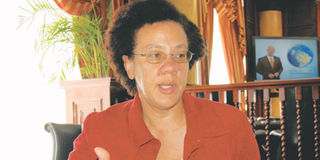Africa Online founder goes digital

Digital Divide Data Managing Director Amolo Ng’weno. Photo/PHOEBE OKALL
In 1994, as the world witnessed the Rwanda genocide, three young Kenyans were busy connecting the continent to the internet.
Ayisi Makatiani, Karanja Gakio and Amolo Ng’weno, who knew each other while studying in the US, formed Africa Online, one of the continent’s internet trailblazers.
Although the company is now in the hands of Telkom South Africa, the trio made a mark and millions.
Ms Ng’weno, a graduate of Harvard and Princeton universities, is back with a new mission: to revolutionise Business Processing outsourcing (BPO).
She is managing director of US-based Digital Divide Data (DDD), which has operations in South East Asia and officially opens in Kenya on Tuesday.
“I’m excited to take the lead in bringing this sustainable business to Africa,” says Ms Ng’weno. “The Kenyan unit is the Africa flagship.”
As DDD Kenya boss, she aims to replicate the Africa Online success in outsourcing.
“My dream of connecting Africa through internet was realised and now we want to do the same in outsourcing,” Ms Ngw’eno says.
“We can learn from the success of India. The good thing is that Kenya has the asset, a well educated workforce with pretty good command of English and analytical skills.”
DDD is coming with a new concept – impact outsourcing – to create jobs for slum youths.
She says this year it will invest more than a $1 million (Sh80 million) and has secured $895,000 (about Sh72 million) grant from Rockefeller Foundation to for its social enterprise model, which has been successful in Asia.
DDD will invest in IT business that will train and employ 300 youth from Nairobi slums.
They will do jobs such as digitising books, documents and historical newspapers, scanning, text conversion, and XML (Extensible Markup Language) markup.
They will also do data entry and conversion services like academic data entry, records management, and direct marketing.
It targets poor youth who can’t afford university or disabled people and neglected by society.
“We’ve created a work-study programme where people can develop technical skills, learn on the job, earn an income for themselves and their families, and move on to better paying jobs,” she said. Basic qualification is English and computer literacy.
“The employees split their days between on-site training and further education,” says Ms Ngw’eno.
“They work six hours a day on actual client projects mentored by experienced managers. They then spend the rest of their days at school, earning their college courses.”
She is the daughter of Mr Hilary Ng’weno, the journalist-publisher-cum-businessman who was first African editor-in-chief of Nation newspapers in the mid-1960s.
Just like daughter, Mr Ng’weno is Harvard material, with a degree in mathematics and nuclear physics.
While working at the World Bank in Washington, DC, Ms Ng’weno teamed with Makatiani, whom she had met at Massachusetts Institute of Technology, and Gakuo to form Africa Online in the US in 1994.
Mr Makatiani and Ms Ng’weno returned to Kenya to put the business on the ground in 1995 and started operations in February of that year.
Through a series of acquisitions, Africa Online is now 100 per cent owned by Telkom South Africa. Ms Ng’weno also co-founded an online shopping company, Biashara.biz.
DDD employs more than 750 staff in three offices located in Cambodia and Laos, in South East Asia.
“This business empowers our staff with the skills and experience they need to lift themselves out of poverty,” she says. “When our business grows, so does our impact.”
The firm will start with 50 employees and targets to scale up the number to 300 youth in the next two years. “We will start small but hope to have a catalytic role in the growth of outsourcing in Africa,” she adds.
After 3 to 4 years, entry-level staff graduate onto internal management positions at DDD, or good jobs in the local economy.
BPO players have in the past expressed displeasure with the government’s low support in marketing Kenya as an outsourcing destination.
“I believe it’s up to the corporation itself to market its services,” says Ms Ng’weno. “If you are in the tyre business you can’t say that because the government has refused to market for you, so you can’t export,” she says.
The problem was expensive satellite internet, which was solved by the arrival of the undersea fibre optic cable.
“The biggest thing we really need in the BPO market is quality workers,” she notes. “The government has a role to promote education.”




